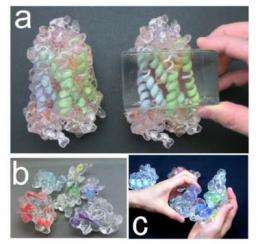The models will enable researchers to quickly and collaboratively see, touch, and test ideas about molecular interactions and the behavior of proteins. Credit: Masaru Kawakami/ Review of Scientific Instruments
For biology researchers, the complex world of molecular proteins – where tens of thousands of atoms can comprise a single protein – may be getting clearer with the help of a new soft, transparent, and squishy silicone model they can hold in their hands. Its advantage over traditional computer and solid models is that it is mostly transparent and easy to manipulate, which will help researchers more intuitively understand protein structures, positions, and interactions.
The models will enable researchers to quickly and collaboratively see, touch, and test ideas about molecular interactions and the behavior of proteins. These insights are keys to innovation in drug design because they help generate discussion about what a particular molecular surface might be like and how a protein is shaped and structured. The models also allow researchers to simulate docking maneuvers involving molecules known as ligands and their partners, a chemical binding step that can turn a biological process on or off.
This boost to molecular modeling comes from Masaru Kawakami, Ph.D., a biophysicist researcher at JAIST (Japan Advanced Institute of Science and Technology) in Ishikawa, Japan. It appears in the current issue of the American Institute of Physics (AIP) journal Review of Scientific Instruments. "Because my new model is soft, users can deform the model and experience ligand binding or protein-protein association, which has never been possible with other physical molecule models", said Kawakami. "I believe my model would be an effective discussion tool for the classroom or laboratory to stimulate inspired learning."
More information: Rev. Sci. Instrum. 83, 084303 (2012); doi: 10.1063/1.4739961
Journal information: Review of Scientific Instruments
Provided by American Institute of Physics





















